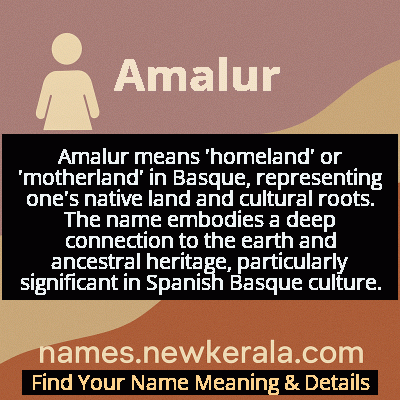Amalur Name Meaning & Details
Origin, Popularity, Numerology Analysis & Name Meaning of Amalur
Discover the origin, meaning, and cultural significance of the name AMALUR. Delve into its historical roots and explore the lasting impact it has had on communities and traditions.
Name
Amalur
Gender
Female
Origin
Spanish
Lucky Number
3
Meaning of the Name - Amalur
Amalur means 'homeland' or 'motherland' in Basque, representing one's native land and cultural roots. The name embodies a deep connection to the earth and ancestral heritage, particularly significant in Spanish Basque culture.
Amalur - Complete Numerology Analysis
Your Numerology Number
Based on Pythagorean Numerology System
Ruling Planet
Jupiter
Positive Nature
Optimistic, inspirational, and creative.
Negative Traits
Scattered, exaggerating.
Lucky Colours
Yellow, gold, purple.
Lucky Days
Thursday.
Lucky Stones
Yellow sapphire.
Harmony Numbers
1, 2, 9.
Best Suited Professions
Arts, writing, communication.
What People Like About You
Creativity, optimism.
Famous People Named Amalur
Amalur
Mythological Figure
Earth goddess and creator figure in Basque mythology
Amalur Gaztelu
Cultural Activist
Promoter of Basque language and cultural preservation
Amalur Irazu
Educator
Founded Basque language immersion programs for children
Name Variations & International Equivalents
Click on blue names to explore their detailed meanings. Gray names with will be available soon.
Cultural & Historical Significance
The name gained additional cultural prominence during the Basque cultural revival movements of the 20th century, when it became symbolic of Basque identity and autonomy. It represents not just geographical territory but the entire cultural ecosystem - language, traditions, and community. For many Basque families, naming a daughter Amalur is an act of cultural affirmation, connecting the child to ancestral roots and the enduring spirit of the Basque people. The name carries the weight of generations and serves as a living reminder of cultural continuity in the face of modernization and external influences.
Extended Personality Analysis
Women named Amalur are often perceived as deeply grounded, nurturing, and strongly connected to their roots and family traditions. They typically exhibit a strong sense of identity and cultural pride, often serving as keepers of family history and cultural knowledge. Their connection to the name's meaning often manifests as a protective, motherly nature and a deep appreciation for nature, home, and community. They tend to be the emotional anchors in their social circles, providing stability and wisdom.
These individuals often demonstrate remarkable resilience and strength, much like the enduring land their name represents. They are typically practical, dependable, and possess a quiet confidence that comes from understanding their place in the world. While they may be traditional in some aspects, they also show adaptability - able to honor the past while navigating modern life. Their personality often blends the steadfast qualities of the earth with the nurturing aspects of motherhood, creating individuals who are both strong pillars of support and compassionate caregivers. They tend to value authenticity, loyalty, and deep, meaningful connections over superficial relationships.
Modern Usage & Popularity
In contemporary times, Amalur has experienced a revival, particularly among Basque families seeking to preserve their cultural heritage. While not among the most common names in Spain overall, it holds significant popularity within the Basque Country and among diaspora communities. The name saw increased usage during the late 20th and early 21st centuries as part of cultural revitalization movements. Modern parents choosing this name often do so to honor their Basque roots and instill a sense of cultural identity in their daughters. The name maintains a traditional yet distinctive quality, appealing to families who value cultural preservation while seeking unique names that stand out from more common Spanish choices.
Symbolic & Spiritual Meanings
Amalur symbolizes the profound connection between people and their native land, representing not just physical territory but the spiritual and emotional bonds that tie individuals to their heritage. The name embodies concepts of fertility, nourishment, and sustenance - both literal and metaphorical. It represents the earth as mother, provider, and protector. Symbolically, Amalur conveys stability, rootedness, and the cyclical nature of life. It speaks to the idea of belonging and the deep, almost primal connection humans feel to the land that sustains them. The name also carries connotations of memory and continuity, representing how cultural identity is preserved and transmitted through generations, much like the enduring qualities of the earth itself.

